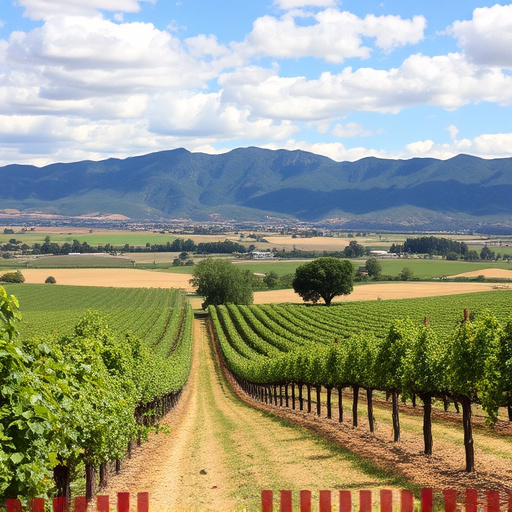The Sonoita region in Arizona has become a hub for sustainable vineyard practices, particularly dry farming. This ancient technique, combined with the region's unique climate and ecology, allows winemakers to produce high-quality, eco-conscious wines while preserving the local terroir. By minimizing irrigation and relying on natural resources, Sonoita's vineyards are setting industry standards for sustainability, attracting wine enthusiasts seeking distinctive, environmentally friendly wines and experiences.
“Discover the thriving ecosystem of eco-conscious vineyards in the scenic Sonoita region of Arizona. This article explores the rising trend of sustainable vineyard practices, particularly dry farming, that are revolutionizing viticulture. By delving into the unique challenges and benefits offered by the region’s climate, we highlight top eco-friendly vineyards leading the way. Learn how dry farming contributes to environmental health and enhances wine quality, making Sonoita a destination for wine enthusiasts seeking sustainable flavors.”
- The Rise of Eco-Conscious Vineyard Practices in Sonoita, AZ
- Understanding Dry Farming: A Sustainable Approach to Viticulture
- Exploring the Unique Challenges and Benefits of Sonoita's Climate for Dry Farming
- Top Eco-Friendly Vineyards Leading the Way in Sonoita, AZ
- How Dry Farming Contributes to a Healthier Environment and Better Wine Quality
The Rise of Eco-Conscious Vineyard Practices in Sonoita, AZ
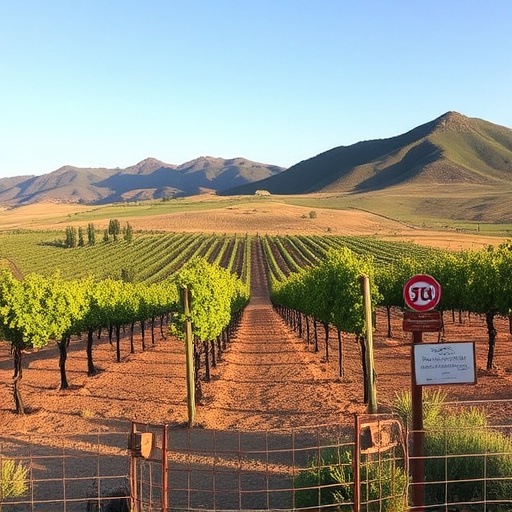
In the picturesque Sonoita region of Arizona, a quiet revolution is taking place among winemakers. The rise of eco-conscious vineyard practices has transformed this once traditional industry into a beacon of sustainability and innovation. Vineyard owners in Sonoita are embracing dry farming techniques, minimizing chemical inputs, and promoting biodiversity to create healthier, more resilient vineyards. This shift not only benefits the local ecosystem but also results in unique and high-quality wines that reflect the region’s distinct character.
The move towards eco-consciousness is driven by a growing awareness of environmental challenges and a desire to preserve the unique terroir of Sonoita. By adopting dry farming, winemakers allow the soil to retain its natural moisture, reducing the need for irrigation. This method not only conserves water but also fosters deeper root systems, leading to more robust grapevines. Additionally, minimizing chemical use reduces pollution and supports the overall health of the local water tables and surrounding wildlife habitats.
Understanding Dry Farming: A Sustainable Approach to Viticulture
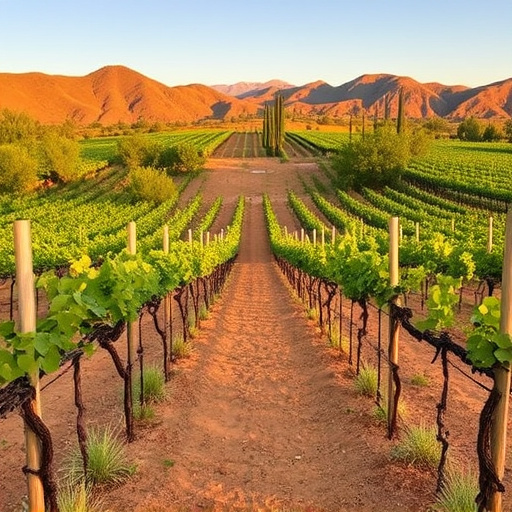
Dry farming is a sustainable and eco-conscious approach to viticulture that’s gaining traction in regions like Sonoita, Arizona. Unlike traditional methods reliant on extensive irrigation, dry farmers rely on minimal water input, allowing the vines to draw from natural rainfall and soil moisture. This method not only conserves precious water resources but also fosters healthier, more resilient grapevines by encouraging deep root systems. In the vineyards of Sonoita, where arid conditions mirror those found in many other drought-prone wine regions globally, dry farming is a game-changer. It demonstrates a commitment to preserving the land while producing high-quality wines that reflect the unique terroir of the region.
In Sonoita’s vast and vibrant vineyards, this ancient practice involves careful observation and precise timing. Winemakers monitor weather patterns closely, planting cover crops to protect the soil and ensuring proper canopy management to minimize water loss. By embracing dry farming, these eco-conscious vineyards not only reduce their environmental footprint but also create wines with distinctive character, often showcasing intense flavors and vibrant acidity that are a testament to the region’s unique climate and terroir. This sustainable approach is transforming the wine industry in Sonoita, AZ, attracting attention from both locals and international visitors eager to experience the region’s dynamic and responsible viticulture.
Exploring the Unique Challenges and Benefits of Sonoita's Climate for Dry Farming
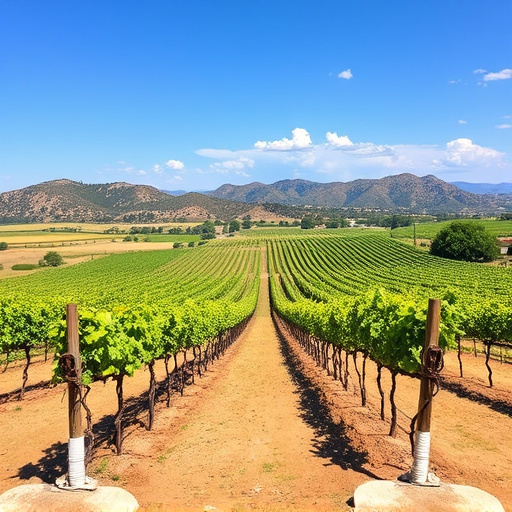
The vibrant vineyards of Sonoita, Arizona, present a unique and captivating landscape for eco-conscious wine production. This region’s climate offers both challenges and advantages for dry farming practices, setting it apart from traditional viticultural areas. With hot summers and cool nights, the Sonoita climate fosters an ideal environment for specific grape varieties that thrive in these conditions.
Dry farming, a sustainable technique, is particularly well-suited to this aride territory. Here, vines depend on natural rainfall rather than irrigation, showcasing resilience and adaptability. This method not only conserves water but also minimizes the risk of disease and pests often associated with over-irrigated vineyards. The benefits extend to soil health, as dry farming encourages deep root systems that improve soil structure and nutrient retention. Exploring these unique characteristics makes Sonoita a captivating destination for those interested in sustainable vineyard management and the diverse wines they produce.
Top Eco-Friendly Vineyards Leading the Way in Sonoita, AZ
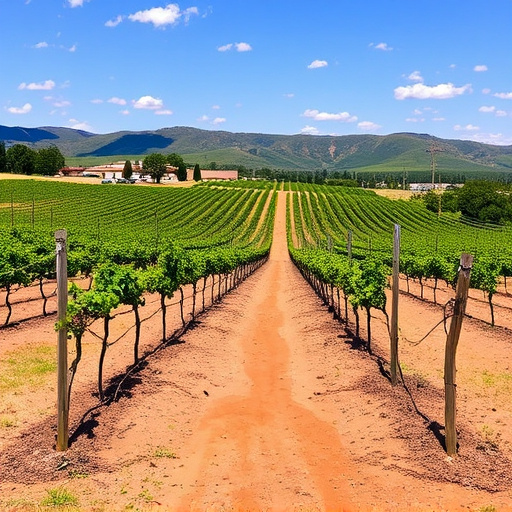
In the scenic Sonoita region of Arizona, a select group of vineyards is leading the charge for eco-conscious wine production. These forward-thinking estates have embraced dry farming techniques, shunning irrigation in favor of the land’s natural water cycle, which not only conserves precious resources but also enhances the unique terroir of their grapes. This commitment to sustainability sets them apart and has made Sonoita a must-visit destination for wine enthusiasts seeking environmentally friendly sips.
Among these eco-friendly pioneers, several vineyards stand out for their innovative practices and stunning landscapes. From organic certifications to the preservation of native habitats, these top vineyards in Sonoita, AZ, are not only producing exceptional wines but also setting benchmarks for the industry’s future. Their dedication inspires both local farmers and global wine producers to reconsider traditional methods, ensuring a more sustainable and resilient viticultural future.
How Dry Farming Contributes to a Healthier Environment and Better Wine Quality
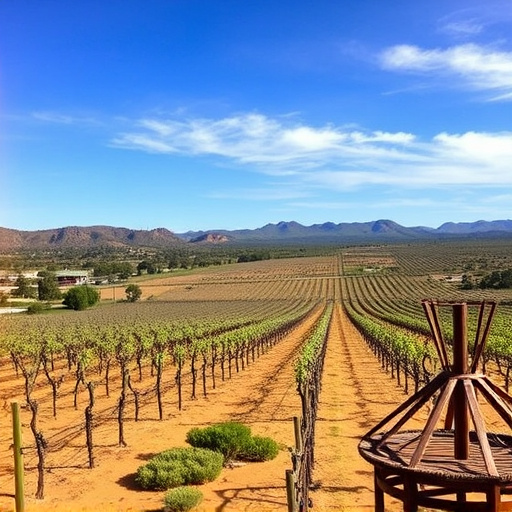
Dry farming, a traditional yet increasingly popular practice in the Sonoita region of Arizona, offers a sustainable approach to viticulture that benefits both the environment and the quality of wine produced. Unlike irrigation, which relies on external water sources, dry farmers rely solely on rainfall and natural water cycles to nurture their vines. This method reduces the carbon footprint associated with water pumping and distribution, making it an eco-conscious choice for vineyards committed to minimizing their environmental impact.
By embracing dry farming, vineyards in Sonoita, AZ, foster a healthier ecosystem within their farms. Without the constant influx of irrigation water, soil biodiversity flourishes, leading to more robust root systems and resilient vines. This resilience translates into improved wine quality, as grapes grown under such conditions often exhibit enhanced flavor profiles and complex aromas. Dry-farmed wines are known for their vibrant character and unique terroir expression, making them highly sought after by wine enthusiasts who appreciate sustainable practices and exceptional beverages.
The eco-conscious revolution in vineyards is gaining traction in the Sonoita region of Arizona, where dry farming practices are not only sustaining the land but also producing exceptional wines. By embracing natural cycles and minimizing intervention, these vineyards are showcasing a harmonious relationship between viticulture and environmental stewardship. As the demand for sustainable wine production grows, the practices observed in Sonoita’s eco-friendly vineyards offer a promising model for the future of winemaking, ensuring both the health of our planet and the quality of its wines.
